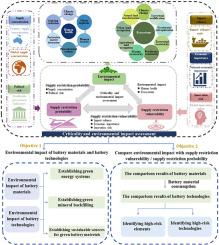Assessing the environmental impacts associated with China's battery minerals and technologies
IF 11.2
1区 环境科学与生态学
Q1 ENGINEERING, ENVIRONMENTAL
引用次数: 0
Abstract
Battery mineral production causes impacts on the environment and human health, which may increase the probability of supply restrictions imposed by exporting countries. As the largest battery producer, assessing the environmental impacts of China's battery-related minerals and technologies is crucial. However, studies that address the integrated issues of supply risks, vulnerability, and environmental impacts are relatively scarce for China. This study assesses China's battery materials and technologies’ environmental impacts. Results show that particulate pollution from nickel, cobalt, and manganese production exceeds CO2 emissions, whereas the reverse is true for other battery materials. Battery technologies that involve nickel, cobalt, and manganese are predominantly affected by particulate pollution, causing over 62 % of human health damage. Each battery technology disproportionately affects the environment through a single element, with contribution values exceeding 46 %. In response, the study proposes strategies for a sustainable battery industry, including green energy systems, tailings backfilling, and circular economy measures.

评估中国电池矿产和技术对环境的影响
电池矿物生产会对环境和人类健康造成影响,这可能会增加出口国实施供应限制的可能性。作为最大的电池生产国,评估中国电池相关矿物和技术对环境的影响至关重要。然而,针对中国的供应风险、脆弱性和环境影响等综合问题的研究相对较少。本研究评估了中国电池材料和技术对环境的影响。结果表明,镍、钴和锰生产过程中产生的颗粒物污染超过了二氧化碳排放量,而其他电池材料的情况恰恰相反。涉及镍、钴和锰的电池技术主要受到微粒污染的影响,对人类健康造成的损害超过 62%。每种电池技术都会通过单一元素对环境造成不成比例的影响,影响值超过 46%。为此,研究提出了可持续电池工业战略,包括绿色能源系统、尾矿回填和循环经济措施。
本文章由计算机程序翻译,如有差异,请以英文原文为准。
求助全文
约1分钟内获得全文
求助全文
来源期刊

Resources Conservation and Recycling
环境科学-工程:环境
CiteScore
22.90
自引率
6.10%
发文量
625
审稿时长
23 days
期刊介绍:
The journal Resources, Conservation & Recycling welcomes contributions from research, which consider sustainable management and conservation of resources. The journal prioritizes understanding the transformation processes crucial for transitioning toward more sustainable production and consumption systems. It highlights technological, economic, institutional, and policy aspects related to specific resource management practices such as conservation, recycling, and resource substitution, as well as broader strategies like improving resource productivity and restructuring production and consumption patterns.
Contributions may address regional, national, or international scales and can range from individual resources or technologies to entire sectors or systems. Authors are encouraged to explore scientific and methodological issues alongside practical, environmental, and economic implications. However, manuscripts focusing solely on laboratory experiments without discussing their broader implications will not be considered for publication in the journal.
 求助内容:
求助内容: 应助结果提醒方式:
应助结果提醒方式:


